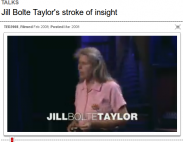Enabling Awareness, Relating and Transformative Change
[ Copyright Stuart B. Hill ]
(Reprint. Points to consider for discussion)
[ Copyright Stuart B. Hill ]
(Reprint. Points to consider for discussion)
Like many others, I've recently had the great pleasure of viewing Dr Jill Bolte-Taylor's TED talk on her experiences during her stroke.
Around 2,450 years ago the ancient Greek philosopher Zeno of Elea was perhaps the first to methodically question a simple fact of life - how do we physically move, such as when blinking an eye, running, or simply falling down?
His questions and arguments, which have become widely known as Zeno's Paradoxes, pointed to the seemingly logical impossibility of the everyday experience of physical movement.
His considerations have perplexed and troubled philosophers and scientists even since. Various assumptions that underpin our modern technologies and sciences were taken for granted. We take for granted that there is always a physical cause for every physical effect - as exemplified by scientists researching to find physical cures for disease, cancer and viruses; and to find the physical genes or brain cells responsible for thoughts, beliefs, emotions, and the experience of love, creativity and joy.
Now, with the advances in the field of quantum physics, we know that a 2,450 year era is nearing its end .. an era in which it has been assumed that our physical brains, bodies and the entire physical universe is continuously existent. An era in which each part (atom, virus, cell, organ, person, planet) was assumed to be continuously existent and functional, with every part contributing to the running of, or dysfunction of, the machinery of life.
We stand at the edge of a grand new understanding of our universe, and ourselves. As Visa International founder Dee Hock foretells, a new era
is struggling to be born -- a shifting of culture, science, society, and institutions enormously greater than the world has ever experienced. Ahead, the possibility of the regeneration of individuality, liberty, community, and ethics such as the world has never known, and a harmony with nature, with one another, and with the divine intelligence such as the world has never dreamed."
There are many highly effective tools and processes used in the field of project management.
Those tools have been finely honed in recent years to expedite and ensure results.
Project management is about vision, taking responsibility, details, creative solutions, time-scaling results ... all highly beneficial aspects when we seek to 'project manage our health'.
Let's consider just a few elements to be covered in this course.
An interesting and worthwhile interview with Sir Ken Robinson on the ABC's 7.30 Report with Kerry O'Brien.
Two parts to the interview.
Part 1 (transcript, mp4, wmv)
Sir Ken Robinson:
I'm in the process of moving, and I've decided to give to friends various books that I've enjoyed, but no longer wish to keep.
When reading books that I've purchased I highlight sections for quick future reference, and any books in my library without highlights usually means I didn't find anything of particular interest in the book. So before handing on a few, I've decided those that did grab my interest, to transcribe the highlighted sections, and rather than put in some quote file (which I'll soon forget), I've decided to post here.
[ Copyright Dr Werner Sattmann-Frese 2009]
Notions of ‘Sustainable Living’ have recently been considered in relation to topics such as clean air and water, Permaculture and solar panels.
Whereas such environmental initiatives and government programs are important and will continue to play important roles in the ecological recovery of this planet, there is now also a growing awareness that to live sustainably we will also have to address the emotional and psychosocial aspects of sustainability.
I've read in recent news reports that people were queuing overnight to buy the new Apple iPhone (S model).
It reminded me of times past when I would look forward to purchasing some new gadget, only to notice how the wonder of the device soon dissipated.
But it also reminded me of one particular time years ago while driving in peak hour traffic, when I had a sense that I was living "on" the moment, not IN it. I was heading back to the office after some appointment, and it felt like I was scurrying around on the surface of life, not deeply in it.